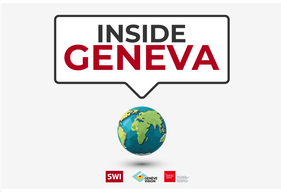It is a bilateral agreement on agriculture signed in 1999 – and not the 1972 Free Trade Agreement – that lifted duties and quotas for Swiss-made cheese destined for the EU market. © Keystone / Peter Klaunzer The authors of a popular initiative to limit immigration to Switzerland from the 27-nation European Union say a “yes” vote will not affect Swiss businesses’ access to the EU market. A fact check shows the claim to be misleading. Opponents to the Swiss People’s Party initiative have warned that the small Alpine country would lose access to the EU market – the destination for just over half of all Swiss exports – if the proposal is voted through on September 27. That, they say, is because ending the free movement of people between the two partners – as the
Topics:
Swissinfo considers the following as important: 3.) Swiss Info, 3) Swiss Markets and News, Featured, newsletter, Politics
This could be interesting, too:
Investec writes The Swiss houses that must be demolished
Claudio Grass writes The Case Against Fordism
Nachrichten Ticker - www.finanzen.ch writes Die Performance der Kryptowährungen in KW 9: Das hat sich bei Bitcoin, Ether & Co. getan
Nachrichten Ticker - www.finanzen.ch writes Wer verbirgt sich hinter der Ethereum-Technologie?

It is a bilateral agreement on agriculture signed in 1999 – and not the 1972 Free Trade Agreement – that lifted duties and quotas for Swiss-made cheese destined for the EU market. © Keystone / Peter Klaunzer
The authors of a popular initiative to limit immigration to Switzerland from the 27-nation European Union say a “yes” vote will not affect Swiss businesses’ access to the EU market. A fact check shows the claim to be misleading.
Opponents to the Swiss People’s Party initiative have warned that the small Alpine country would lose access to the EU market – the destination for just over half of all Swiss exports – if the proposal is voted through on September 27.
That, they say, is because ending the free movement of people between the two partners – as the initiative calls for – would automatically lead to the cancellation of all the other bilateral accords of 1999 (also known as Bilaterals I), which govern trade in goods and services.
But the right-wing People’s Party disputes this, arguing it is not the bilateral accords that ensure access to the EU market.
“Market access is guaranteed by the Free Trade Agreement [between the EU and Switzerland, signed in 1972] and the agreements with the World Trade Organization (WTO),” it says on its campaign website.
The former president of the party, Albert Rösti, went further, telling the Neue Zürcher Zeitung newspaper that the 1972 FTA and WTO agreements provide “duty-free and non-discriminatory access to EU markets”.
These agreements, unlike the bilateral accords, would remain valid in the event of a “yes” vote. But although they are both important for trade relations, the FTA and the WTO system each has its limitations.
Origins of free trade zone
The World Trade Organization, set up in 1995, lays down global trade rules and provides a forum for governments to negotiate trade agreements.
But while the WTO promotes the lowering of trade barriers, it does not eliminate them: member countries can still impose tariffs and other forms of trade protection.
“WTO law forms the basis for international trade relations,” explained Livia Willi, a spokesperson for the State Secretariat for Economic Affairs (SECO). However, “WTO agreements do not afford Switzerland any preferential treatment, such as preferential duty rates or preferential access to the EU’s internal market.”
On the other hand, by signing a bilateral free trade agreement, states can choose to do away with trade barriers. This is exactly what Switzerland and the EU did in 1972.
The FTA eliminated customs duties on industrial goods, lowered them for processed agricultural products, and did away with quotas for these products. The FTA accounts for 98% of Swiss exports to the EU, Willi told swissinfo.ch.
The People’s Party is therefore right in this respect: the FTA gives Swiss businesses access to the EU market – for nearly all of the country’s exports.
But for Switzerland, doing business with the EU today is not limited to the export of goods. The EU is by far its most important trade partner in services, for example, and that’s mainly covered by the 1999 free movement of people agreement.
“Many aspects of market access are not covered in the FTA,” Willi pointed out.
What the bilateral accords cover
Among the other 1999 bilateral accords are ones that cover air and land transport, providing reciprocal access to aviation markets and to markets for the transport of goods and people by road and rail between Switzerland and the EU.
Another accord is the agreement on agriculture, which eliminated duties and quotas for cheese and non-tariff barriers for basic products such as alcohol and animal feed. Without this agreement, Switzerland would be treated as a third country for exports of animals and products of animal origin to the EU, said Willi. The EU is Switzerland’s main trading partner for agricultural products, the Federal Department of Foreign Affairs reports, which account for about 4.6% of total Swiss exports worldwide.
“The Bilaterals I have created conditions for Swiss suppliers in a number of areas that are similar to those of an internal market, including legal security,” Willi added.
The bilateral accords also facilitate the export of goods laid down in the 1972 FTA. The Mutual Recognition Agreement (MRA), for example, removed technical barriers to assess whether products meet regulations in key industrial sectors like machinery and medical devices. According to Willi, the MRA “covers two-thirds of trade between Switzerland and the EU with respect to industrial products.”
Without the MRA, she added, Swiss businesses would face administrative hurdles to get their products approved for the EU market, which means “products could not be exported as per the status quo”.
If the bilateral accords were terminated, no agreement at the WTO could act in their place.
“Despite their overall economic importance for Switzerland […] the WTO agreements alone would hardly be a sufficient basis for the high degree of economic integration that exists between Switzerland and the EU today,” said Willi.
Verdict: Misleading
The 1972 FTA created a free trade zone for what amounts to 98% of Swiss exports to the EU, so the claim of the People’s Party is correct to some extent.
But the 1999 bilateral accords expand market access to a number of other areas where Swiss businesses are active today, and remove technical barriers to make it easier to trade goods based on the FTA.
For their part, WTO rules do not guarantee Switzerland preferential or duty-free access to the EU market but mainly act as a basis for trade relations.
To say that access to the EU market is guaranteed by the 1972 FTA and WTO agreements is therefore misleading.
Tags: Featured,newsletter,Politics








